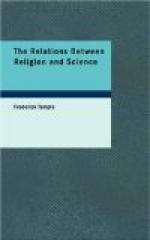Thirdly, the New Testament affirms with a clearness previously unknown the immortality of the soul and the future gift of that spiritual body which shall in some way spring from the natural body as the plant grows from the seed. There had grown up, no doubt quite naturally, anticipations of this doctrine and ever stronger and more deeply-rooted persuasion that it must be true. But it is revealed in the New Testament as it is taught nowhere else, and it is sealed by the Resurrection of our Lord, ever since then the historical centre of the Christian Faith. How exactly it harmonises with the teaching of the spiritual faculty I have pointed out before.
And, lastly, the New Testament not only tells us what never was told before of man’s nature as a spiritual being and of his destiny hereafter; it tells also what was never told elsewhere of the nature of God and of the relations between Him and His creature man. The unity and spirituality of the Godhead so strenuously insisted on in the Old Testament, is no less insisted on in the New. But the mysterious complexity embraced within that unity, though darkly hinted at in the older teaching, is nowhere clearly set forth, but in the latter. We may find anticipations of the teaching of St. Paul and St. John, and of our Lord Himself as recorded by St. John, in the Book of Proverbs, in the Prophets, in the Rabbinical writers between the Prophets and the New Testament, and we can see in Philo to what this finally came unaided by Revelation. But the Christian teaching on our Lord’s nature and on the Incarnation is distinct from all this. And it is in the Christian form, and only in that form, that the doctrine has satisfied the spiritual needs of the great mass of believers.
Now there cannot be any doubt that the hold which this teaching has had upon mankind has depended entirely on the extraordinary degree in which the teaching of the Bible has satisfied the conscience. Without that no miracles however overwhelmingly attested, no external evidence of whatever kind, could have compelled intellects of the highest rank, side by side with the most uncultivated and the most barren, to accept it as divine, nor could anything else have so often rekindled its old fire at times when faith in it had apparently withered away. The teaching of the Bible has always found and must always find its main evidence within the human soul.
And the fact that the teaching of the Bible, though when examined afterwards it turns out to be development or evolution, yet was always given at the time as a revelation, so far from diminishing the force of this internal evidence adds to it still more force than it would otherwise have. For what underlies the very conception of revelation is the doctrine that all progress in higher spiritual knowledge is bound up with conscious communion with God. Now it is an experience common to all believers that in that communion is to be found not only all strength




